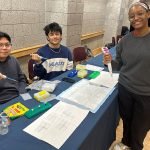Angel Rodriguez learned how to detail cars on YouTube. After school and late at night after work, he studied videos that explained arcane matters like the ideal brush length to maximize the performance of a rotary polisher and the best techniques to power-wash a grungy car until it gleamed.
Mr. Rodriguez, a 21-year-old car aficionado, has worked the checkout counter at Toby’s Feed Barn for the past three years. When his shift ends, he details cars in his free time, building a small base of customers by approaching neighbors whose vehicles look like they could use a buffing. He wants to turn that side hustle into a mobile car-detailing business serving West Marin.
“I just don’t have all the right tools yet,” he said. “I’m buying them little by little.”
He’s saving for a professional buffer, a headlight-polishing kit and a set of rim-cleaning attachments.
Home is a small house on the Nunes Dairy in the Point Reyes National Seashore, where his father milked cows for six years. The dairy shut down this fall, one of several closing under a legal settlement that will end all dairying and most ranching in the park.
A few miles away, Santiago Gomez, 24, lives on the Evans Ranch and helps run Gomez Marin Maintenance, his family’s landscaping and cleaning company, which he hopes to take over when his parents retire.
“Even though we already have a business, we’re trying to make it more official, expand it and gain information on how to keep it healthy,” he said.
Both men are participants in Emprende West Marin, a 12-week course developed by the Marin Small Business Development Center with support from the West Marin Fund and the county. The program, taught in Spanish, fosters local entrepreneurship by supporting aspiring small-business owners who have ideas or even fledgling enterprises but lack capital or connections.
About 45 people, all Latino, have been attending classes since early October. Many are from families whose ranch jobs and homes are disappearing.
“For a while, I’ve wanted to learn how to start a business,” Mr. Rodriguez said during his lunch break at Toby’s. “These classes are giving me so much confidence in actually starting this business. There’s so much that I’ve been learning that I thought I already knew.”
The sessions move from concept to execution, covering fundamentals of budgeting, marketing and licensing, and has lessons in public speaking and project management. “It’s everything from defining your mission and vision to understanding the four P’s of marketing—product, price, place and promotion,” said Laurie O’Hara, who teaches the course. She described her students as “people who already know how to do something well—they just haven’t had the chance to turn that skill into a business and monetize.”
Businesses under development in the cohort range from food trucks and bakeries to photography studios, clothing labels, tattoo parlors, translation services and child-care programs. To qualify for up to $5,000 in seed grants provided by the West Marin Fund, participants must attend regularly, complete a business plan and secure a business license or file articles of incorporation. “We’re moving step by step through the plan so that by the end, they’ll have all the parts,” Ms. O’Hara said.
The program came together quickly after the seashore settlement, said Miriam Hope Karell, executive director of the Marin S.B.D.C. “The immediate goal was to support people being displaced from the ranches, but we’ve really been building the plane as we fly it,” she said. “This was the fastest we’ve ever launched a program. We only pulled it off because we relied on trusted local leaders to get the word out.”
Among those leaders was Rosa Rodriguez—Angel’s mother—who runs a small cleaning business and helped recruit participants. “In programs like this, the biggest obstacle comes when people feel something is too hard or they don’t understand it,” said Valeria Brabata, the West Marin Fund’s director of programs. “Instead of asking for help, they just stop showing up. They need a peer who says, ‘You can do it, don’t give up.’”
Roughly a third of the participants are current or former residents of ranches inside the seashore; the rest live elsewhere in West Marin. Funding comes from the county’s microenterprise support initiative.
After graduating, students will become S.B.D.C. clients and receive one-on-one help with marketing, financing and hiring. Organizers hope to continue the program next year, with sessions in both English and Spanish. “We adjust to whoever is in the room,” Ms. Karell said. “Some are starting service businesses versus products. Some are tech savvy and others don’t even have an email. Success will look different for each of them.”











